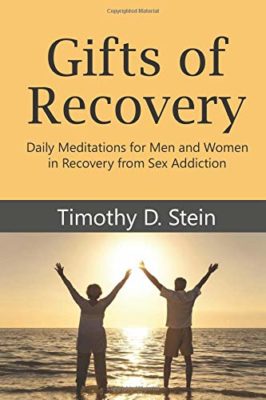By Tim Stein
Meditation from Gifts of Recovery.
A hot bath is like a big hug.
–Therapy lesson
Hugs are soothing and nurturing. Our earliest soothing and nurturing experience was being in mother’s womb. The warm, watery environment still runs deep in our psyche. When we take a hot bath, we tap into that deep soothing and nurturing experience. Soothing and caring for ourselves is a helpful tool for sobriety and an important part of recovery.
When have I neglected my self-care? What were the consequences? What gifts await me as I acknowledge that I am worthy of nurturance and deserve to be soothed?
As wounded healers, we are constantly preaching the importance of self-care to our clients. We encourage meditation, mindfulness, exercise, healthy diet, social connections, and all manner of tools and experiences that help our clients to be their best selves. We encourage our clients to embrace self-care so they thrive in their own lives and also so they impact others positively or, at the very least, neutrally.
As wounded healers, it is especially important that we listen to our own advice regarding self-care. When we fail to practice self-care in our daily lives or when we are being buffeted by our addictive thoughts and urges, not only do we not thrive, but we impact others (some of whom are our clients) in less than positive ways. At best, therapy becomes stagnant. At worst, we become ethically compromised.
Here are some guidelines for self-care that we can follow to ensure we thrive and provide ethically sound therapy to our clients.
- Take time for intentional self-care.
- Have a consistent recovery/self-care routine.
- Develop and maintain professional peer supports.
- Explore transference/countertransference issues with supervisors and/or professional peers.
- When appropriate, take time for your own individual therapy.
- Continue your own personal recovery work.
- This may include but is not limited to having a sponsor/mentor, consistently attending meetings, and having regular connection and accountability with people in your recovery community.
- As appropriate, integrate your recovery into your professional environment.
- This may include but is not limited to informing your supervisor of your recovery, attending recovery meetings for professionals, and leaning on your professional peers for support.
- The decision to share your recovery with your supervisor should NOT be made independently. This decision should incorporate guidance from your sponsor, appropriate members of your recovery community, and other professionals who are in recovery. Also, this decision should take your partner’s experience into consideration.
- Acknowledge any addiction struggles and/or time-limited relapses to your recovery and professional peers who hold you accountable regarding sobriety and recovery.
- Seek supervision in order to successfully manage your own recovery while effectively working with clients.
- If you have a significant relapse, take direct action to stabilize your sobriety and recovery and consider taking a time-out from working with clients.
- Consider more intensive recovery activities such as increasing the frequency of recovery phone calls, increasing the frequency of meetings with your sponsor, increasing the frequency of recovery meetings you attend, starting or increasing the frequency of your individual therapy sessions, or going to an inpatient program to regain sobriety traction.
- The decision to take a time-out from working with clients should NOT be made independently. This decision should incorporate guidance from your employer, your sponsor, appropriate members of your recovery community, and other professionals who are in recovery. This decision should again take your partner’s experience into consideration.
Note: A special thanks for Carol Jurgensen Sheets, LCSW, PCC, CSAT, CCPS-S and James Annear, LMHC, CSAT-S, CCTP, CCPS-S who helped me to develop this list of guidelines.

